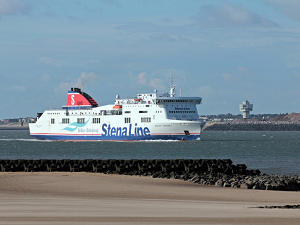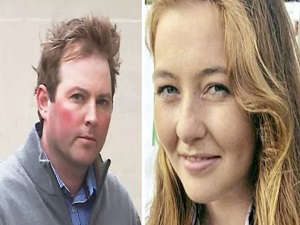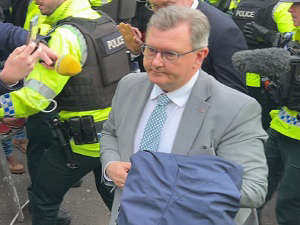
By Michael McHugh and David Hughes, PA.
Checks will be needed on some goods entering Northern Ireland from the rest of the UK as part of Brexit but bureaucracy will be kept to a "minimum", the British Government said.
Some infrastructure screening animal and food products at ports will be "expanded".
Northern Ireland will have to follow EU rules on agriculture and manufactured goods, ensuring access to its single market and keeping the border with the Republic free-flowing in a key concession maintaining a decades-old peace.
Screening will be supported by electronic processes, the Cabinet Office added, once the transition period finishes at the end of this year.
Michael Gove, minister in charge of Brexit preparations, said: "Our proposals will deliver unfettered access for Northern Ireland businesses to the whole of the UK market; ensure there are no tariffs on goods remaining within the UK customs territory; discharge our obligations without the need for any new customs infrastructure in Northern Ireland and, finally, guarantee that Northern Ireland businesses benefit from the lower tariffs we deliver through our new free trade agreements with third countries."
The EU wants to avoid Northern Ireland being used as a backdoor entry point to its market and has pressed for controls.
The UK's position paper said there will be some limited additional process surrounding goods arriving in Northern Ireland, using "all flexibilities and discretion".
It physically checks under 1% of third country movements notified through customs declarations and the Government said in this case the risk would not be as high.
Using "sophisticated" data on trade flows for goods entering Northern Ireland it would work with the Irish authorities to tackle smuggling with the latest technology.
There will be no new physical customs infrastructure but some existing entry points for agri-food goods will "expand" to provide for "proportionate" additional controls.
The Government will maintain existing facilities at Belfast Port, Belfast International Airport, Belfast City Airport and Warrenpoint Port.
Northern Ireland goods sales to Great Britain are worth £8.1 billion, with purchases worth £10.5 billion.
Together that trade comprises 56% of the country's total external trade in goods.
There will be no tariffs on goods remaining within the UK customs territory under the position adopted by Britain for negotiation with the EU.
Businesses in Northern Ireland will have "unfettered" access to sell to the rest of the UK market under the plan.
A Northern Ireland protocol was drawn up as part of the EU Withdrawal Agreement with Brussels, and the paper published on Wednesday elaborates on how Britain intends to implement it, whether or not a wider EU trade deal is struck.
It says: "Some checks will be needed, supported by relevant electronic processes, in line with the island of Ireland's existing status as a single epidemiological unit, building on what already happens at ports like Larne and Belfast.
"What the protocol does not do is create - nor does it include any provision for creating - any kind of international border in the Irish Sea between Great Britain and Northern Ireland.
"That means its provisions must entail the minimum possible bureaucratic consequences for business and traders, particularly those carrying out their affairs entirely within the UK customs territory."
The Government has ruled out, for example, asking supermarkets delivering from Great Britain to stores there to pay tariffs.
Many goods could be automatically classified as internal to the UK.
The arrangements entail some "streamlined and simplified" new administrative process for traders, new electronic import declaration requirements, and safety and security information for goods entering Northern Ireland, the document stated.
DUP First Minister Arlene Foster said the UK's objectives must be "unmovable" and not saddle businesses with further costly administrative burdens.
Ireland's deputy premier Simon Coveney said there would be scepticism in the EU around the UK's insistence that there would be no new customs infrastructure.
He said there would need to be a lot of technical discussion around the plan that was published.
"I think the really tricky area will be around customs," Mr Coveney told RTE.
"And I think there will be a lot of sceptical people in the EU when they hear the British government saying there will be no new physical infrastructure around customs in Northern Ireland or in Great Britain facing Northern Ireland."


 Swann refuses to rule out resigning if budget is not changed
Swann refuses to rule out resigning if budget is not changed
 Fresh inquests ordered into deaths of 15 killed in McGurk’s bomb blast
Fresh inquests ordered into deaths of 15 killed in McGurk’s bomb blast
 Trial ends after man accused of murder of young showjumper is found dead
Trial ends after man accused of murder of young showjumper is found dead
 A brief hearing and chaotic scenes as Donaldson makes first court appearance
A brief hearing and chaotic scenes as Donaldson makes first court appearance